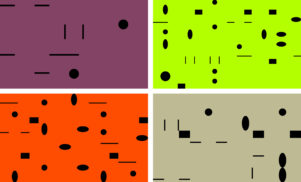When it comes to music, Andrew Khedoori thinks we need to slow down. He has a point.
Over the last few years, at least since Spotify rose to near ubiquity, music culture — and, by extension, the act of listening — has often felt like it’s occurring in fast-forward. Most albums are now easily accessible on every major streaming platform. You might read about an artist, open the app, listen, then move on in the space of minutes, all for the cut price sum of a monthly bill — sometimes just to your mobile service provider. Reviews, interviews and thinkpieces come thick and fast before dissipating into the ether of social media. Time moves at warp speed.
Khedoori, the founder of Australian label Preservation Music, launched Longform Editions in June as a response to such trends. Their pitch is simple: release four tracks by four artists every two months. Khedoori doesn’t consider the project a label but a collective for deep listening, as coined by the late pioneering composer Pauline Oliveros. The runtime of tracks frequently lasting close to 30 minutes, sometimes even verging on an hour. Visually, each composition is accompanied by Mark Gowing’s designs of abstract typography, the shapes of which spell out the artist and track name. “I’m really keen for the idea of deep listening to re-enter the vernacular of music consumption,” Khedoori says. “I worry that we’re not allowing ourselves the time to absorb a piece of art.”
Longform Editions exists predominantly as a website and on Bandcamp (but the music is also available to stream on Spotify). The twelve tracks that have already been released were created by artists around the globe broadly working under the banners of ambient, drone and minimalism. Yamaneko delivered a fragile 23-minute meditation on the memory of a video game map while N Chambers (who has also recorded as Panabrite) takes a full half hour to let a sprawling minimalist composition unfurl gradually. Elsewhere, Pauline Oliveros’ student Marielle V. Jakobsons and Chuck Johnson have collaborated as Saariselka to produce a glacial piece of ambient country music.
Slowness is folded carefully into areas of the project besides the music. There’s no deadlines for the artists and because Longform Editions isn’t a typical label. Its output is freed from the conventional album cycle involving sales sheets, distribution, retail and press. “It actually streamlines the operation so you’re really only dealing with the artists,” he says. The project’s structure has also enabled him to work with a greater range of artists than he has with Preservation Music.
Khedoori hopes Longform Editions will help to restore some patience back into the listening experience in a modest but meaningful way. “I get the feeling, if only anecdotally, that there’s a lot of skipping going on,” he says. “Because streaming platforms are so easily accessible, you might not treat the music with as much consideration and care as you would if you’ve spent money on a physical product.”
A potentially bigger problem is the algorithmic funneling that occurs on such platforms. Every Monday on Spotify, your Discover Weekly playlist is updated, featuring a selection of algorithmically chosen tracks based on your listening habits (alongside the platform’s endless other branded Recommendations). The issue, according to Khedoori, comes with exactly what you’re discovering. “The one thing the streaming services always promised was that you could have access to all the music in the world. Everything was at your fingertips and anything was discoverable,” says Khedoori. “I don’t think streaming services offer you anything revelatory when it comes to music discovery. There’s no actual surprise.”
In contrast to the algorithms of the streaming services, Longform Editions is driven by a strongly defined sense of curation Khedoori honed while working as Music Director at Sydney’s 2SER-FM radio station. “I’d have my brain blown by presenters a few times a week. Streaming services can’t necessarily offer that,” he says.
Khedoori knows there are plenty of labels releasing wonderful experimental music but suggests such outputs can often appear diffuse to listeners, particularly when submerged — and increasingly hidden — by the algorithms of streaming platforms. He hopes Longform Editions might remedy this situation by acting as a hub for extended music. While checking out Matthewdavid’s weightless ambient piece, listeners might subsequently stumble across the industrial field recordings of Cruel Diagonals or the piano improvisations of Midori Hirano.
Such discovery might unfold at a more languid pace, offering just a few more minutes of respite. “One of the artists who recently submitted a piece said, ‘I hope that when you listen to this it’s like having a long soak in a hot bath,’” Khedoori tells me. “The whole point of Longform Editions is to create a space where you can allow yourself that time.” He describes listening to the tracks in the morning as the light slowly changes, the music a means of focusing his mind. He stresses it’s not background music, though, perhaps keen to distance Longform Editions from the creeping rise of “chill” and mood playlists.
Longform Editions doesn’t nostalgically look back to a halcyon time before streaming services. Rather, Khedoori seeks to interpolate its approach within existing structures in a bid to gently bend their rules. “We want to create something which is more like an art gallery except with music,” he says sincerely. “You can visit and spend as much time as you can, like you would looking at a painting.” Ultimately, Khedoori thinks there’s more at stake than just the continuing health of experimental music for a small, dedicated audience. “Predominant listening platforms are so strict in it what they give out to you. What hope does culture have to emerge and develop in new and interesting ways if it’s essentially recycling and regurgitating on a constant basis.”
Lewis Gordon is a freelancer writer. Find him on Twitter.
Read next: The final frontier: How can dance music exist in a digital space?





























